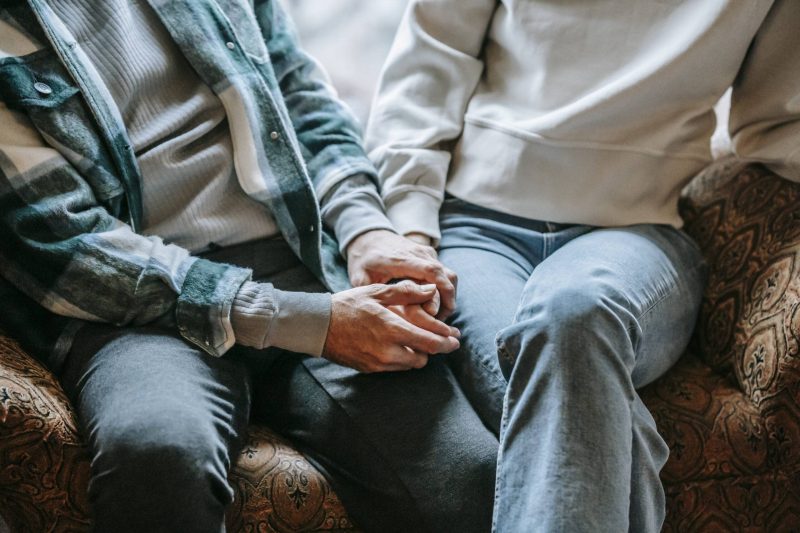Addressing Trust Issues on the First Date
To address trust issues on your first date with someone, you need to be equipped with the right tools. In order to do that, this section titled “Addressing Trust Issues on the First Date”, with sub-sections including “Identifying Your Trust Issues”, “Communicating Your Concerns”, and “Setting Boundaries” will guide you through the process of handling your trust issues with care and empathy.
Identifying Your Trust Issues
As you go on a first date, you might doubt and worry about your partner’s trustworthiness. We call this ‘Trust Issues.’ It’s important to work out your Trust Issues before beginning. Assess yourself and find the cause of your mistrust – whether it be past experiences or difficulty trusting others.
Realizing your Trust Issues can show how they may impact new relationships. For instance, asking too many questions can come off as interrogating, not interested – and may make a partner pull away.
It is vital to speak up about any worries in a non-threatening manner, so your potential partner can understand and believe you.
Managing intimacy with Trust Issues is tough. A true story (without naming names) of discovering your Trust Issues during past dates can help others open up about their anxieties – creating an atmosphere of understanding and honesty. To be honest, my first date plan is to write an autobiography and give it out with a warning.
Communicating Your Concerns
Communication Is Crucial To Combat Trust Issues.
Being candid and open about your concerns, boundaries and expectations is key to overcoming trust issues. Misunderstandings or withheld information can lead to distrust and confusion.
Share what you’re feeling and why you have trust issues. These may come from past relationships, personal experiences, or insecurities. Discussing these openly can build trust and reassure your partner.
Remember that effective communication takes effort and time. Take it slow. Ask questions and listen when your date talks about themselves. This way you can avoid overwhelming each other and build a connection gradually.
Be aware of when it’s time to listen actively instead of talking incessantly or interrupting your date.
Overall, transparency and openness are needed to get over trust issues. Talk about areas where trust may be lacking in each other’s life and actively listen. These steps can help create and sustain a relationship of mutual trust and respect. Plus, remember: ‘no’ is a complete sentence, and saying it with a smile only confuses people!”
Setting Boundaries
Establishing Personal Limits
Setting and respecting your boundaries is key to building trust on a first date. Communicate clearly about your comfort levels with physical touch, sensitive topics, and anything else you don’t want to discuss yet. Be assertive but gentle.
Equally important, respect the boundaries set by your date. Take things forward naturally, and be patient. Everyone’s limits are different, so figure out what works for you and communicate effectively.
Having an open-minded outlook also shows cultural sensitivity. This encourages two-way communication, without imposing expectations. Respect each other’s personal space and create positive vibes for potential long-term relationships. Trust is like a cracked mirror; hard to fix once broken.
Building Trust on the First Date
To build trust on a first date with someone, who has trust issues, you need to show honesty and transparency, practice active listening and understanding, and demonstrate consistency. These actions will assure your date of your trustworthiness, and give the impression that you value and respect their concerns.
Showing Honesty and Transparency
Being honest in relationships is key. Share your thoughts and feelings to build trust and respect. On the first date, express intentions and expectations openly. This will create a strong base for future interactions and make the other person feel comfortable.
Furthermore, small actions like arriving on time, dressing appropriately, being attentive, and having sincere conversations can help build trust. Actions can display character more than words.
One tip is to avoid boasting about yourself. Ask questions, instead, to show interest in knowing your date.
It’s nerve-wracking, but transparency in communication helps build meaningful relationships. Don’t miss out on connecting with someone due to fear or vulnerability; transparency creates lasting relationships. Listen often to strengthen your skills – unless you’re listening to your ex’s voicemail, in which case it just gets weaker.
Active Listening and Understanding
For trust on a first date, actively listen and comprehend your partner’s point of view. Pay attention to verbal and non-verbal signs, reflect back on what they said, ask clarifying questions, and recognize their emotions.
Engaging in this type of communication makes a secure setting for your partner to open up and feel heard. This establishes trust and mutual understanding.
Be present in the moment and dodge distractions such as looking at your phone or around the room. By focusing solely on your partner, they know that their feelings and thoughts matter.
Be empathetic to your partner’s experiences. Acknowledge their feelings without judgement, even if you don’t agree.
These techniques cultivate a stronger connection while creating a base of trust for future conversations. To build trust, consistency is key, unless you are consistently late – that’s like building a time machine.
Demonstrating Consistency
Crafting a Trustworthy Image
One effective way to foster trust on a first date is by being consistent in action and behavior. Following through with plans, being punctual, and showing genuine interest is a great way to demonstrate reliability. Furthermore, having clear communication and being honest about intentions can strengthen this.
Another way to show dependability is by being attentive and fully present during the meeting. This involves actively listening, responding thoughtfully, and steering clear of distractions such as cell phone use. These behaviors illustrate seriousness and respect for the potential partner.
It is beneficial to keep the same level of consistency beyond the first date. Maintaining a trustworthy personality can create long-lasting trust in the relationship.
For example, Barack Obama went above and beyond when he took Michelle Obama to an art exhibit before lunch at a small café for their first date in 1989. His punctuality and thoughtful planning were appreciated by Michelle, setting the bar for future dates.
Creating trust on a first date is like trying to catch a unicorn – but with more disappointment and less enchantment.
Coping Strategies for Trust Issues on Dates
To cope with trust issues on dates, practicing self-care, seeking professional help, and taking time for self-improvement can be helpful solutions. In this section, we’ll explore these coping strategies in detail to help you navigate through the anxiety and fear that may arise during first dates and other romantic encounters.
Practicing Self-Care
Control Your Mental Health While Dating
Prioritize self-care to keep your mental health up while dating. Exercise, meditate and eat healthily to promote physical and emotional well-being. Take breaks from social media and focus on yourself to build a positive mindset.
Set Boundaries with Dates to Relax
Protect your peace by setting boundaries with dates. Communicate clearly about what makes you comfortable or uncomfortable. Spend time on mutual interests, not impressing them.
Maintain Healthy Relationships to Build Trust
Building trust takes time. Be honest and communicate for a healthy relationship. Be vulnerable when you feel safe enough with someone committed to understanding and supporting you.
Practice Mindfulness for Grounding
Stay present during dates by practicing mindfulness like deep breathing or visualization. Reduce anxiety issues with trust. Practice it whenever needed.
Self-Care is a Priority
Make yourself a priority. Surround yourself with supportive people who respect others. Reach out to a professional if difficulties arise. Trust issues? A therapist can help.
Seeking Professional Help
Tackling trust issues on dates? Consider Seeking Expert Advice. This approach can provide valuable understanding of what’s causing the issues, plus practical methods to manage them.
These pros are great at helping people improve relationships and grow emotionally. They can help you deal with past traumas or other experiences that may be causing the trust issues. They can also assist in spotting patterns in behaviour that damage relationships, and give strategies for building trust, communication, and intimacy.
Seeking Expert Advice has been successful in making people’s relationships better, and finding greater contentment in life. It may seem daunting, but going to a qualified therapist or counsellor can show strength instead of weakness. It’s admitting needing help and room for growth.
It’s important to pick a therapist who specializes in relationship counselling if you want to address the issue directly. Make sure you feel comfortable with the therapist you choose. Therapies need a safe atmosphere to talk about hard topics.
Many successful individuals have used professional help to find better relationships – proving it works. Even when self-help methods fail, this is a good option. It’s better than another failed date with a liar.
Taking Time for Reflection and Self-Improvement
When facing trust issues on dates, introspection and self-growth can be important. Self-reflection helps uncover any worries that are blocking genuine connections. Investing in yourself and focusing on getting better builds the confidence to trust others again.
Look inside to evaluate expectations, find attachment styles, and spot patterns that lead to trust problems. Be honest about past experiences and how they could prevent future partners.
To improve yourself, try therapy, mindfulness exercises, or hobbies. Taking time for reflection helps you address your fears. It takes patience and commitment, but it often works.
Once, I had major trust issues and decided to focus on myself. I practised yoga to relax and became more mindful. Over time, I reconnected with friends and built new relationships with high levels of trust through self-realization.
Frequently Asked Questions
Q: How do I know if I have trust issues on a first date?
A: If you tend to be overly suspicious or cautious around your date, regularly question their intentions and actions, or have a history of experiencing betrayal or mistrust in past relationships, then you may have trust issues.
Q: Should I disclose my trust issues to my date on the first date?
A: This is a personal decision. While it’s important to be honest and authentic, disclosing your trust issues on the first date may create a negative impression or make your date uncomfortable. You can wait until you’ve established some rapport to share this information.
Q: How do I handle my trust issues while on a date?
A: It’s important to approach the date with an open mind and without expectations. Try to focus on getting to know your date and building rapport rather than worrying about their intentions or actions. Remember that trust takes time to build, so try not to rush the process.
Q: What are some red flags to look out for on a first date if I have trust issues?
A: Some red flags that may trigger your trust issues include dishonesty, lack of transparency, inconsistency, disrespect, or a general feeling of discomfort or unease. However, it’s important not to jump to conclusions or make assumptions based on these factors alone.
Q: How do I rebuild trust if I’ve been betrayed in the past?
A: Rebuilding trust takes time, communication, and effort from both parties. It’s important to address the underlying issue(s) that led to the betrayal, establish clear boundaries and expectations, and work together to rebuild trust through consistent actions and follow-through.
Q: Can I still have a successful relationship if I have trust issues?
A: Yes, but it takes work and commitment from both partners. It’s important to address and work through your trust issues, establish clear communication and boundaries, and cultivate a sense of mutual respect and understanding. Counseling or therapy may also be beneficial in this process.









